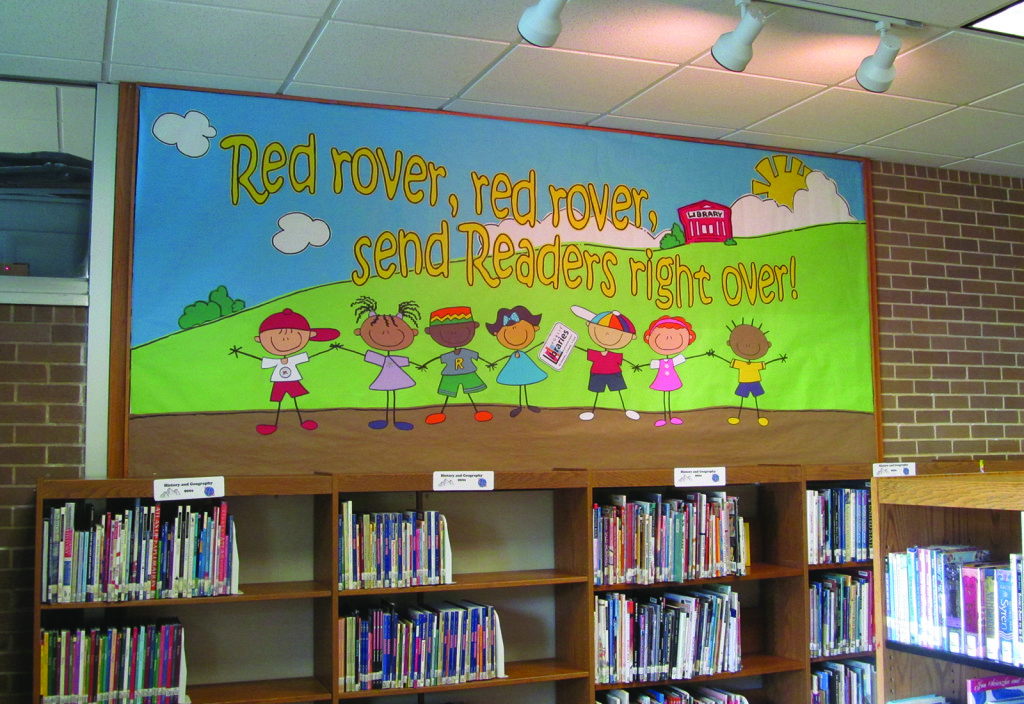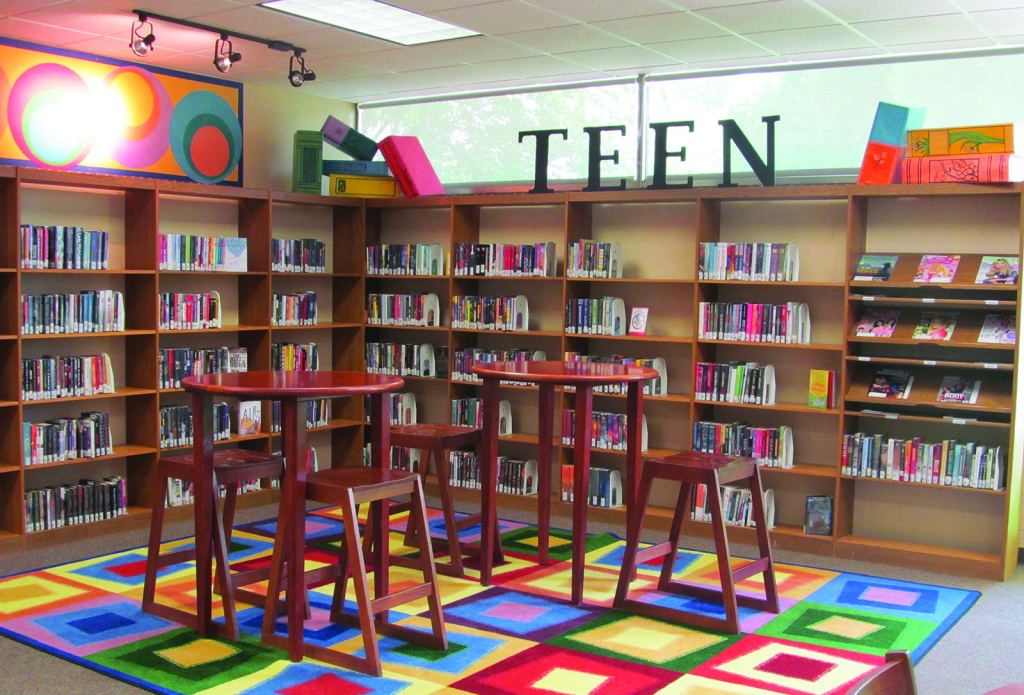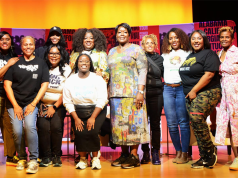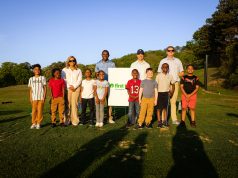
By Kathryn Sesser-Dorné
Special to The Times

She wasn’t always a storyteller.
At least that’s what Casandra Scott, or Ms. Cas as kids at the library call her, thought as she spent decades behind the scenes.
“My background is theater, production actually. Lighting design, costume design, but specifically stage management and production management is what I did for about 25 years,” she said.
After decades away, Scott, a native of Birmingham, found herself needing to move back to her hometown to help take care of her mother. “When I moved back here, [theater] wasn’t a possibility … It’s not a possibility when you’re a caregiver for someone. Those hours are not ones you can keep.”
Now a Library Assistant III, Scott finds that while the library may not have been her first home, what she was doing before prepared her for this important role in the lives of Birmingham’s children. While she was still working in theater, Scott was able to see first-hand how storytelling was a needed tie-in to help with children’s literacy.
“Prior to moving back here, I was the production manager for the Children’s Theatre Company in Minneapolis, Minn.,” Scott said. “There was a grant to do a project with the local schools and our theater with Jack Zipes (author, and former Professor of German at the University of Minnesota), and it was a storytelling project where the schools bring storytellers in to help with storytelling and literacy. I ended up working with him as one of the actor/teachers. The actor/teachers come in and they present stories and they work in conjunction with the classroom teacher. It was called the Neighborhood Bridges Project, and now it’s a national project.
“And it just so happened it was the right place at the right time, and storytelling wasn’t anything I had done before. It ended up being wonderful,” she said. “I loved doing that, so when I came back here I had to think ‘What kind of job am I going to do while I’m caring for someone?’”
Thankfully she didn’t have to wonder long, and jumped at the chance to work part-time with the Birmingham Public Library system. With what she had been doing in Minneapolis, it seemed like a natural segue.
“How perfect is this that I get to continue with storytelling? I auditioned for the job, and it turned out to be a perfect fit. It spoke to everything I had ever done. Theater is storytelling, everything is storytelling.
“One of the wonderful things about storytelling, is you speak to your audience,” Scott said. “So who’s my audience? Whether it’s children or adults, there’s a responsibility that you have. For children, they are learning language. They are learning to read. They are learning how to associate and live with each other. They are discovering their own creativity, so as a storyteller we are there to assist in that. We have an obligation that what we present to them will help in that journey of discovery.”

The Toddler Set
Critical thinking is another aspect that she and her colleagues at the Avondale Regional Branch work to impart to their youngest charges. Working through lessons in books, children are able to learn from others and their triumphs or mistakes.
“You don’t always have to put your hand on something hot to know that it’s hot. You can look at the experience that someone else has had,” Scott added.
Scott works alongside another storyteller, Eve Parker, who she jokingly refers to as “the baby whisperer.” Parker, a favorite among the toddler set, leads story time each Monday morning at the Avondale branch, as well as at other libraries throughout the system.
“We have totally different styles of storytelling, but they complement each other,” Scott said. “And we sort of arrive at the destination in different ways, which is really cool, because it shows the kids you can get there the way you’re going to get there. Because she has the youngest children, she does lots of concrete things: Colors, shapes, letters. I tend to go toward more abstract things: Peace, love, friendship or anger. I was a little nervous with the younger kids for a while.”
But Scott is a natural with any age. After only eight years with the library, Scott has gleaned a few lessons of her own from the children she spends her time reaching out to. In her curriculum on peace, Scott uses stories like “Polly Pastrami Achieves World Peace,” and the B.G. Hennesy book, “Because of You,” to show the impact one person, like Martin Luther King Jr., can have on the world.
“I was doing a program on peace one January [for MLK Day], and one quote they can understand now since they won’t learn his history until later, was ‘Darkness cannot stamp out darkness, only light can do that. Hate cannot stamp out hate, only love can do that.’
“So we get to the end of the program, and I ask them ‘What does peace mean?’ And Ari, a three-year-old, raised his hand and said ‘Peace means that if someone is mean to me, I’m not going to be mean back to them.’ And his teachers and I looked at each other,” Scott said with a laugh. “Of course they get it. They get this. They are so much smarter than we are. They know so much.
“It’s the mechanical things we have to teach them, that other part is innate. And if we teach them incorrectly, we undo that part that they already know.”

Future goals
As for her personal future goals with the library, Scott is turning her focus to those children who have a hard time sitting through a traditional storytelling program.
“There are an increasing number of children who have a hard time being in that environment where they have to sit and listen,” she said. “That works for some children, for most children. But increasingly, that is beginning to be an issue. But we don’t want to create a situation where they don’t want to come. So, how do we open up what it is that we do so they can participate?
“There are things that you do just based on what the children need.”
As times continue to change, and new generations turn to social media for news, and tablets for reading, the importance of the library may be becoming lost on some. Scott and her colleagues are hard at work each day to try and change that thought, and get people back inside the doors of Birmingham’s 16 branches.
“It takes a village. And this is one of the village centers. It is the resource of life here,” Scott said. “We’re trying to figure out, as a library system, to make it known, to put it out there, that here it is, here’s your center.”
For Scott, who remains hopeful about this wonderful institution and its place in the community, it’s easy to get up every day and come to the job she was always meant to do.
“I love working at this library,” she said. “I am so blessed in being given things in this life that I can just love.”
AFTER-SCHOOL PROGRAMSAvondale Regional Branch of the Birmingham Public Library Now that Summer Reading is over, and the new school year gets underway in Birmingham, so does a wealth of afternoon programs for students in the Avondale area. After Labor Day, students can find a different activity each day after school. MONDAY: Study Buddies “What we do, in the very beginning, is the same thing they do in school. For the first month it means getting their bearings,” storyteller and library assistant Casandra Scott said. “One of the things the kids learn is how to behave in the library, what the expectation is. It would be utter chaos if we didn’t go by the list of rules. We’re all participants. While students do flock to the library after the day ends at Avondale Elementary School, the library is not set up to be a daycare, just an open place where children can come to learn. “We’re not an after-school program, we’re not funded to be. Children just come here after school. But we love having them here,” Scott said. “They’re here to do their homework, they’re here to socialize, they’re here to learn. “Some kids need help with their studies, and we don’t have a tutor,” she said. Students from Altamont have donated their time in this capacity, as well as UAB fraternities. It’s still up in the air who will help on Mondays this coming school year. “We don’t stay on them and have them do their homework,” Scott said, trusting that the children know what they need to get done each day. “We have discovered in our department that we’re not so great at math,” she said with a laugh. “Mrs. Eve (Parker) went and took a course, a refresher of the new math they are doing, because we’d have to Google it to see if we were doing it right … Because we do help with homework. But are we tutors? No. We help with homework in as much as we are serving the rest of the public at the same time.” Children third-grade and older are able to come into the library on their own, and Scott stresses an important point for parents of the students she serves. “You’ve got to know where your child is. Make sure, at the beginning of the school year, if your child comes into the library on their own, they need to know their phone number. They need to know their address. They need to know their parents’ or caregiver’s real name, other than ‘mommy’ or their nickname.” “We love them,” she said. “Their parents love them, and we want things that can be prevented to not happen.” |




